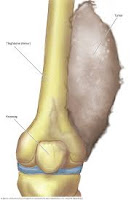Thyroid function is usually not affected in most thyroid cancers. Therefore the patients have thyroid cancer symptoms but show no indication of low thyroid (hypothyroidism symptoms) as well as high thyroid (hyperthyroidism symptoms.)
If indeed you are looking for indications and thyroid cancer symptoms, below are a few to look out for.
A nodule or lump in the throat, usually painless. However sometimes it is accompanied with pain. Hoarseness or a difficulty in swollen as the thyroid affects the adjacent tissues in the throat. Swollen lymph-nodes in the neck.
If however you are saying to yourself, "None of those symptoms apply to me" Then maybe as mentioned in the first paragraph of this article, we could perhaps be dealing with an under active thyroid commonly known as hypothyroidism.
If indeed you are looking for indications and thyroid cancer symptoms, below are a few to look out for.
A nodule or lump in the throat, usually painless. However sometimes it is accompanied with pain. Hoarseness or a difficulty in swollen as the thyroid affects the adjacent tissues in the throat. Swollen lymph-nodes in the neck.
If however you are saying to yourself, "None of those symptoms apply to me" Then maybe as mentioned in the first paragraph of this article, we could perhaps be dealing with an under active thyroid commonly known as hypothyroidism.
Thyroid Cancer, Thyroid Cancer, Thyroid Cancer, Thyroid Cancer, Thyroid Cancer, Thyroid Cancer, Thyroid Cancer, Thyroid Cancer, Thyroid Cancer, Thyroid Cancer, Thyroid Cancer, Thyroid Cancer, Thyroid Cancer, Thyroid Cancer, Thyroid Cancer, Thyroid Cancer, Thyroid Cancer, Thyroid Cancer, Thyroid Cancer, Thyroid Cancer, Thyroid Cancer, Thyroid Cancer, Thyroid Cancer, Thyroid Cancer, Thyroid Cancer, Thyroid Cancer, Thyroid Cancer, Thyroid Cancer, Thyroid Cancer, Thyroid Cancer, Thyroid Cancer, Thyroid Cancer, Thyroid Cancer, Thyroid Cancer, Thyroid Cancer, Thyroid Cancer, Thyroid Cancer, Thyroid Cancer, Thyroid Cancer, Thyroid Cancer, Thyroid Cancer, Thyroid Cancer, Thyroid Cancer, Thyroid Cancer, Thyroid Cancer, Thyroid Cancer, Thyroid Cancer, Thyroid Cancer, Thyroid Cancer, Thyroid Cancer, Thyroid Cancer, Thyroid Cancer, Thyroid Cancer, Thyroid Cancer, Thyroid Cancer, Thyroid Cancer, Thyroid Cancer, Thyroid Cancer, Thyroid Cancer, Thyroid Cancer, Thyroid Cancer, Thyroid Cancer, Thyroid Cancer, Thyroid Cancer, Thyroid Cancer, Thyroid Cancer, Thyroid Cancer, Thyroid Cancer, Thyroid Cancer, Thyroid Cancer, Thyroid Cancer, Thyroid Cancer, Thyroid Cancer, Thyroid Cancer, Thyroid Cancer, Thyroid Cancer, Thyroid Cancer, Thyroid Cancer, Thyroid Cancer, Thyroid Cancer, Thyroid Cancer, Thyroid Cancer, Thyroid Cancer, Thyroid Cancer, Thyroid Cancer, Thyroid Cancer, Thyroid Cancer, Thyroid Cancer, Thyroid Cancer, Thyroid Cancer, Thyroid Cancer, Thyroid Cancer, Thyroid Cancer, Thyroid Cancer, Thyroid Cancer, Thyroid Cancer, Thyroid Cancer, Thyroid Cancer, Thyroid Cancer, Thyroid Cancer, Thyroid Cancer, Thyroid Cancer,












